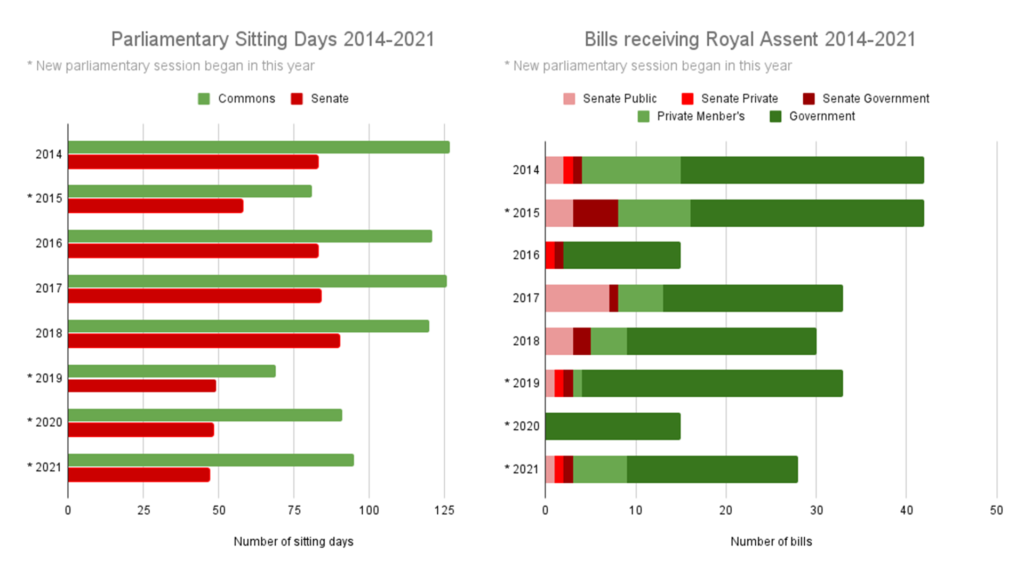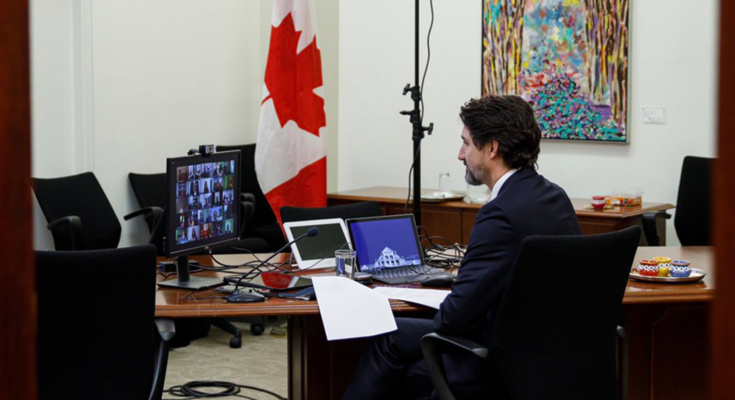By: Simon Hopkins
When the COVID-19 pandemic brought the world to a standstill in the spring of 2020, MPs and senators left their distinguished chambers in downtown Ottawa to work from home offices and spare bedrooms, just as millions of Canadians did while the unprecedented public health crisis unfolded.
The transition online was challenging for many as parliament was thrust into uncharted waters that broke from more than 150 years of tradition. Most parliamentarians were given a computer and headset but had no experience with Zoom, the now-ubiquitous online platform parliament chose to use to conduct hybrid sittings and committee meetings.
“We attempted to find a way for parliament to continue to do its business and to make sure that … Canadians knew the seat of their democracy continued to function,” Government House Leader Mark Holland said in a speech in June, as he looked back on the early days of the pandemic.
In both chambers, the hybrid model allowed most parliamentarians to join sittings virtually, with some physically present in Ottawa.
At the height of the pandemic, they debated legislation somewhat normally. However, the most substantial adjustment to regular proceedings was a change to how they voted. They were unable to stand to indicate their vote, and yelling “yay” or “nay” into a Zoom call was chaotic.
Senators held flashcards to their cameras to indicate their votes. Meanwhile, the House of Commons developed a secure voting app that allowed members to click yes or no from anywhere in Canada.
More than two years on, both chambers revisited the decision by debating whether to extend the motions allowing virtual attendance in a hybrid parliament. Senators chose to ditch the hybrid option and have sat fully in person since September, the substantially larger House of Commons extended its motion for hybrid parliament to June 2023.
What happens beyond that date remains to be seen. While some parliamentarians argue aspects of the new hybrid model should remain in place, regardless of the pandemic, detractors say it makes parliament less effective and efficient.

Back in June, when Holland presented the motion in the House to continue with hybrid sittings for another year, he said the virtual option would continue to allow members of parliament to participate when they were unable to attend in-person.
“Last week, there were five members of the Liberal caucus who had COVID, and one of these people was the Prime Minister,” he said. “All were still able to participate in these proceedings.”
But some pushed back, saying it was time for all MPs to return to the Hill.
“The reality is that public health agencies … have limited the restrictions,” said John Brassard, a Conservative MP from Ontario. “Everything is opening up. Everything except parliament … the world is moving on from COVID.”
The vote was tight, but the NDP sided with the government and ultimately pushed it through with 177 votes to 144.
The House of Commons committee that studies the day-to-day business of house procedures is currently studying hybrid sittings to produce a report that will help inform future decisions. It has heard testimony since October from many MPs, as well as technical experts, support staff and officers from foreign parliaments.
The committee met privately this week to discuss the draft of the report it will present to the House of Commons later this year.
The first witness to testify at the committee was Speaker of the House Anthony Rota. With public health measures lifted in all parts of the country, he said in his speech that it is “worthwhile to reflect on what parts, if any, of hybrid proceedings the House may wish to retain.”
Rota noted multiple considerations when discussing hybrid sittings, including dress code, video call backgrounds and connectivity issues. He also acknowledged the initial constraints that limited the number of committee meetings held throughout the pandemic due to technical limitations.
“The availability of interpretation services has had a particular impact on committees,” Rota said. “[Committees] had to adapt their meeting times because of resourcing constraints and to facilitate the participation of members across multiple time zones.”
He applauded the House’s information technology staff who have implemented parliament’s investment, which allowed for higher-quality video conferencing.
NDP MP Carol Hughes, who represents a large riding in northern Ontario, told the committee that a hybrid parliament had benefits beyond protecting against COVID-19 transmission. A hybrid option would allow parliamentarians to continue serving while unable to travel to Ottawa for a variety of reasons.
“Whether it’s the death of a loved one, injury, illness or flights … we should still be able to participate no matter what,” Hughes said. “I went to Mongolia a few years back and they were further ahead than we were with voting.”
Other MPs argued that working from home would give them more time to interact with their constituents. Liberal Yvonne Jones from Labrador said she often doesn’t fly home on weekends like most parliamentarians because it’s too difficult of a journey.
Despite those arguments, Conservatives said MPs could perpetually stay at home in their ridings to give themselves an edge.
“To use the voting app and hybrid model as an excuse to perpetually electioneer in their ridings to effectively build their brand was always a concern,” Brassard said during a speech in the House.
The debate over changing the way an institution as historic as parliament operates has benefits beyond preventing the spread of a virus such as COVID-19.
MPs, including former environment minister Catherine McKenna, Holland and B.C. NDP MP Laurel Collins – who last year gave a speech in the House with her daughter Alora in her arms – have called for parliament to be more family friendly in order to attract more people, especially women, to run.
“From door to door, our commute is about 10 hours … travelling back and forth with a seven-month-old is not easy,” she told the House in 2021.
“When I hear MPs in this debate say that those who want a hybrid Parliament want it because we do not want to come to work … I want a hybrid Parliament so that when my daughter gets sick and I am stuck in Victoria, I can still participate. I want a hybrid Parliament so that pregnant MPs have the choice to keep working,” Collins said.
Winnipeg MP Kevin Lamoureux, who serves as Holland’s parliamentary secretary, says he also wants parliament to retain some of the digital elements it has adopted in recent years.
“I’ve long believed we need to modernize the House of Commons,” he said in an interview Thursday. “We have to maintain the voting application,” he said, explaining it allows for more engaged and productive MPs.
“The old archaic way of voting is incredibly time-consuming,” he said. “The voting application is really more transforming than anything else.”
Opinions in the Senate were similarly diverse.
Quebec Sen. Leo Housakos said things have improved with the return of entirely in-person sittings. “You can tell that we’re back to dealing with the agenda in a more intensive way,” he said in an interview.
During the hybrid sittings, Housakos said senators could not conduct their work as well as they should. He described the hybrid Senate as “less efficient and less effective.”
Hybrid parliament allowed the government to pass hundreds of billions of dollars of spending “under the guise of COVID aid” without proper review, he said.
“We would reconvene the Senate just to pass supply bills because we were all terrified of passing germs around,” he said. “Committees did not have the ample time to study those supply bills.”
Nova Scotia Sen. Colin Deacon, who sits with the Independent Senators Group, acknowledged some aspects of hybrid parliament were poorly implemented. But that doesn’t mean it should all be scrapped.
Allowing witnesses to testify to committees remotely can save money and help the Senate fight against climate change, Deacon said.
He hopes lessons learned from the last two years will inform how the Senate does business in the future.
“Can we learn from the experience over the two years?” he asked. “How we do that is open for debate, but whether we do that should not be.”




